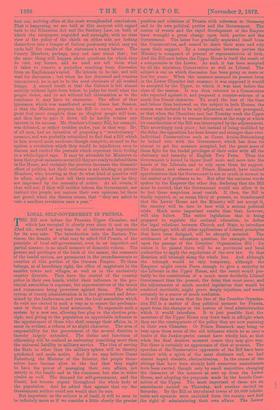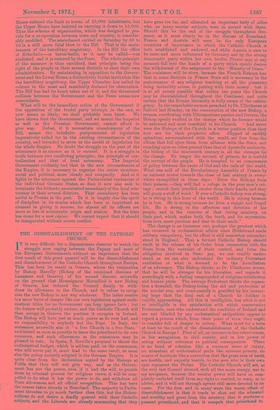LOCAL SELF-GOVERNMENT IN PRUSSIA.
T7Bill now before the Prussian Upper Chamber, and vhich has occupied it closely ever since it met on the 22nd ult., would at any time be of interest and importance for its own sake. The introduction into the Eastern Pro- vinces, the domain of what may be called Old Prussia, of the principle of local self-government, even in an imperfect and partial manner, is no small measure of domestic reform. The powers and privileges of the lords of the manor, the remnants of the feudal system, are paramount in the arrondissements or counties of this portion of the German Empire. To them belongs, as of hereditary right, the office of magistrate in the smaller towns and villages, as well as in the exclusively country districts. They have the control of the country police in their own hands, whilst their influence in the pro- vincial assemblies is supreme, the representatives of the towns and communes being powerless against them. The whole system of county administration is in fact governed and deter- mined by the landowners, and even the local assemblies which do exist are elected in such a. way as to ensure the predomin- ance in them of the local aristocrats. To supersede such a system by a new one, allowing free play to the elective prin- ciple, and giving to the population an appreciable influence in the appointment of those who shall manage their affairs, is, it must be evident, a reform of no slight character. The area of responsibility for the government of the several districts is thereby largely extended. The duties and functions of citizenship will be realised as embracing something more than the universal liability to military service. The idea of serving the State in other than the military sphere will be thereby quickened and made active. And if we may believe Count Eulenburg, the Minister of the Interior, the people them- selves have become alive to the fact that they ought to have the power of managing their own affairs, not merely in the family and in the commune, but also in wider circles as well. The demand for self-government, said the Count, has become urgent throughout the whole body of the population. And he added that against that cry the Government neither could nor would shut its ears.
But important as the subject is of itself, it will be seen to be infinitely more so if we consider a little closely the precise position and relations of Prussia with reference to Germany and to its own political parties and the Government. The course of events and the rapid development of the Empire have wrought a great change upon both parties and the Government. The latter has gradually separated itself from the Conservatives, and ceased to share their aims and rely upon their support. By a compromise between parties the Ministry is composed at present of representatives of both. And the Bill now before the Upper House is itself the result of a compromise in the Lower. As such it has been accepted by all the ministers, Conservative as well as Liberal. The subject is one on which discussion has been going on more or less for years. When the measure assumed its present form in the Lower Chamber last summer, it was supposed it would be accepted by the Upper, to which it was sent before the close of the session. It was then referred to a Commission who reported against it, and prepared a counter-scheme of a much less liberal character. To avoid the loss of the time and labour thus bestowed on the subject in both Houses, the session was declared to be only adjourned, and not prorogued, so that when the Chambers met last Tuesday week the Upper House might be able to resume discussion at the stage at which its consideration of the Bill was interrupted by the adjournment. This accordingly took place ; but instead of being mollified by the delay, the opposition has been keener and stronger than ever. Individual Conservatives such as Count Arnim-Boitzenburg do indeed vote with the Government, which has done its utmost to get the measure accepted, but the great mass of them fight for the feudal privileges of their order with all the obstinacy and tenacity of English Tory Peers. Thus the Government is forced to throw itself more and more into the hands of the Liberals, and to rely upon them for support. The silence and absence of Prince Bismarck have excited apprehensions that the Government is not so much in earnest in the matter as it professes to be. But after the ominous words spoken by the Emperor the other day, declaring that the Bill must be carried, that the Government would not allow it to be lost, these suspicions must vanish. If, then, the Bill is finally rejected, or, as seems likely at present, so transformed that the Lower House and the Ministry will not accept it, the country will be face to face with a serious political crisis. Much more important results than that, however, will also follow. The entire legislation that is being prepared to regulate the national education, to define the legal relations between Church and State, to introduce civil marriage, with all other applications of Liberal principles that have been designed, will be abruptly arrested. The settlement of the education question, for example, depends upon the passage of the Counties' Organization Bill ; for unless it be passed there will be no provincial and local authorities to apply the regulations of the new law. So that Reaction will triumph along the whole line. And although the triumph would be only temporary, although the Emperor might create Peers enough to give a majority to the Liberals in the Upper House, and the result would pro- bably be the constitution of a much more decidedly Liberal Government than the present, the delay that must occur, and the adjournment of much needed legislation that would be rendered inevitable, might prove deeply injurious, and would certainly be a source of much confusion.
It will thus be seen that the fate of the Counties Organisa- tion Bill is a matter of deep political moment for Prussia, - apart from the changes in the system of local administration which it would introduce. It is just possible that the members of the Upper House may draw back in affright when they see the consequences of the policy they are now pursuing to their own Chamber. Or Prince Bismarck may bring to bear upon them some of the old influence which he as once a leader of the Junker-partei cannot have wholly lost, so that when the final decisive moment comes they may give way. But there is certainly no appearance of that at present. The speeches of the Conservative opponents of the Bill have been instinct with a spirit of the most obstinate and, we had almost hoped obsolete, obstructionism. In the course of the sittings that have been already held numerous amendments have been carried, though only by small majorities, changing the character of the measure as sent up from the Lower House, and adopting the proposals made by the hostile Com- mittee of the Upper. The most important of these are an amendment carried on Thursday, and another carried on Saturday. By the Bill as introduced towns of 30,000 inhabi- tants and upwards were excluded from the county, and had the right of administering their own affairs. The Lower
House reduced the limit to towns of 25,000 inhabitants, but the Upper House have insisted on carrying it down to 15,000. Thus the scheme of organisation, which was designed to pro- vide for a co-operation between town and country, is consider- ably modified. The amendment carried on Saturday by 82 to 68 is a still more fatal blow to the Bill. That is the main- tenance of the hereditary magistracy. In the Bill the office of Erbschulze—or baron-bailie, as it may be called—was abolished, and it is restored by the Peers. The whole principle of the measure is thus sacrificed, that principle being the right of the people in their several districts to elect their own administrators. By maintaining, in opposition to the Govern- ment and the Lower House, a distinctively feudal institution like the hereditary magistracy, the Upper Chamber has nailed its colours to the mast and manifestly declared for obstruction. The Bill has had its heart taken out of it, and the threatened collision between the Government and the Peers seems now unavoidable.
What will be the immediate action of the Government if the opposition of the feudal party triumph in the end, as now seems so likely, we shall probably soon know. We have shown that the Government, and we meant the Imperial as well as the Prussian Government, cannot afford to give way. Defeat, if it necessitate abandonment of the Bill, means the indefinite postponement of legislation imperatively called for in the existing circumstances of the country, and intended to serve as the model of legislation for the whole Empire. No doubt the struggle on the part of the aristocracy is as sincere as it is earnest. It is a straggle in truth between two conflicting principles, the principle of cen- tralisation and that of local autonomy. The Imperial Government evidently feel that in the new circumstances of the Empire, it is necessary to organise the entire structure, social and political, more closely and compactly. And as it fights to the uttermost against the Particularist tendencies of the individual German States, so does it now also seek to terminate the hitherto uncontested ascendancy of the local aris- tocracy in their several districts. That ascendancy has been useful to Prussia in the past. To it is largely due the spirit of discipline in its armies which has been so important an element in giving it success, for almost all its officers are more or less of aristocratic origin and station. But the time has come for a new re'gime. We cannot expect that it should be inaugurated without severe conflict.



































 Previous page
Previous page